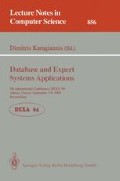Abstract
Information about the case to be decided rarely is complete and precise. So dealing with imprecise information definitely is one of the major issues of legal decision making. In order to be able to identify a non-empty set of precedents most similar to our case, we introduce the Dempster-Shafer rule for combining information from independent sources and use the resulting mass functions to determine the importance of each precedent in our knowledge system. Additionally, the method is illustrated by an example.
Preview
Unable to display preview. Download preview PDF.
References
A. de Korvin, R. Kleyle, R. Lea, The object recognition problem when features fail to be homogeneous, International Journal of Approximate Reasoning 1993; 8:141–162.
A. de Korvin, G. Quirchmayr, S. Hashemi, Legal decision making under uncertainty, in Proceedings of Expersys-93 (H.S. Nwana, T. Martelli, Eds.), i.i.t.t, 1993: 50–67.
R. Kleyle and A. de Korvin, Two methods for object identification with imprecise information. To be published in 1994.
R. Giles, Foundations for a theory of possibility, in Fuzzy Information and Decision Processes (M. M. Gupta and E. Sanchez, Eds.), North Holland Publishing Co., 193–195, 1982.
T. F. Gordon and G. Quirchmayr, Der Einsatz der Modellierungssprache OBLOG zum Entwurf von Juristischen Expertensystemen im Wege des Prototyping am Besipiel eines Modells des Verfahrens der Eidesstattlichen Versicherung, Springer IFB 143, 137–154, Berlin 1987.
J.-Y. Jaffray, Application of Linear utility theory to belief functions, in Uncertainty in Artificial Intelligence, Vol. 5, (Max Henrion, Ed.), New York, Elsevier Publishing Co., New York, 1–8, 1990.
S. B. Marsh and J. Soulsby, Outlines of English Law, McGraw-Hill, London, 124 ff., 1987.
R. Reiter, On Reasoning by Default, Proceedings of the 2nd Symposium on Theoretical Issues in Natural Language Processing, Urbana, Illinois.
P. Smetz, Belief functions versus probability functions, in Uncertainty in Artificial Intelligence, Vol. 5, (Max Henrion, Ed.), New York, Elsevier Publishing Co., New York, 1–8, 1990.
T. M. Strat, Decision analysis using belief functions, Intern. J. Approximate Reasoning 4, 391–417, 1990.
R. Susskind, Expert Systems in Law, Oxford University Press 1987.
A. Zebda, The Investigation of Cost Variances: A Fuzzy Set Theory Approach, Vol. 15, 1984, 359–388. Decision sciences.
R. Yager, A general approach to decision making with evidential knowledge. Uncertainty in Artificial Intelligence (L. N. Kanal and J. F. Lemmer, Eds.), North Holland, Amsterdam, 317–327, 1986.
Author information
Authors and Affiliations
Editor information
Rights and permissions
Copyright information
© 1994 Springer-Verlag Berlin Heidelberg
About this paper
Cite this paper
de Korvin, A., Quirchmayr, G., Hashemi, S. (1994). Identifying precedents under uncertainty. In: Karagiannis, D. (eds) Database and Expert Systems Applications. DEXA 1994. Lecture Notes in Computer Science, vol 856. Springer, Berlin, Heidelberg. https://doi.org/10.1007/3-540-58435-8_196
Download citation
DOI: https://doi.org/10.1007/3-540-58435-8_196
Published:
Publisher Name: Springer, Berlin, Heidelberg
Print ISBN: 978-3-540-58435-3
Online ISBN: 978-3-540-48796-8
eBook Packages: Springer Book Archive

